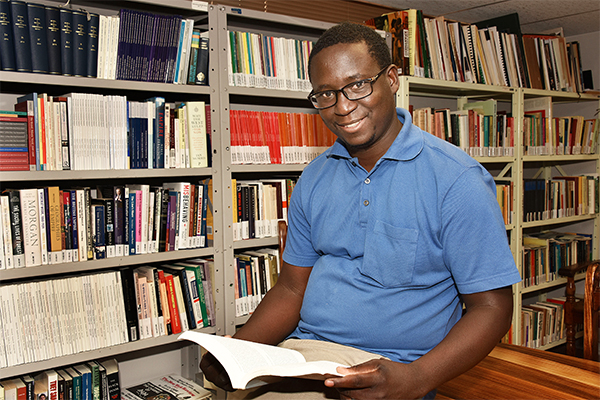Latest News Archive
Please select Category, Year, and then Month to display items
07 March 2024
Photo Lunga Luthuli
 Prof Francois Strydom, Senior Director at the Centre for Teaching and Learning and Simphiwe Kunene, the first African DREAM scholar and a master’s student from the Faculty of Education.
Prof Francois Strydom, Senior Director at the Centre for Teaching and Learning and Simphiwe Kunene, the first African DREAM scholar and a master’s student from the Faculty of Education.
The University of the Free State (UFS) received recognition for its commitment to student success at the 2024 Achieving the Dream (ATD) conference which celebrated its 20-year anniversary. Simphiwe Kunene, an Education master's student originally from the Qwaqwa campus, was selected to represent South Africa as the first DREAM scholar from Africa as part of the conference.
The Achieving the Dream network of over 300 institutions, which is one of the largest movements in US higher education aims to transform colleges and universities so that students of colour and a lower socio-economic status are supported to earn a degree. The UFS is a leading partner in the Siyaphumelela Network, which has been working for 10 years with ATD to enhance the success of students in South Africa. Prof Francois Strydom, Senior Director at the Centre of Teaching and Learning (CTL), accepted the award on behalf of the institution.
Prof Strydom said that collaboration with the ATD and Siyaphumelela institutions has helped the UFS to develop cutting-edge approaches to “level the playing field” and support Kovsies to earn their undergraduate degrees.
The first African DREAM scholar
Kunene was selected as the first African DREAM scholar from the Siyaphumelela network. To select the DREAM scholar, each Siyaphumelela partner institution nominated one student as a preferred candidate. From the proposed candidates, the DREAM scholar was selected by the South African Institute for Distance Education (Saide) based on the following: demonstrating resilience, academic excellence, and a deep commitment to making a positive difference in universities and personal communities.
He addressed the conference of over 2 000 delegates and shared with them his hopes and dreams. Many members of the South African delegation said Simphiwe did his country proud. He had the following to say about his opportunity to be a DREAM scholar: “Being a DREAM scholar was life changing for me, exposing me to an array of opportunities I never knew were possible and available for me. It was as if, for a moment, the world had stopped to just listen to what I had to say."
The way forward
The UFS will continue its work as a partner of the Siyaphumelela network for the 2024-2026 cycle. The multi-stakeholder project team is focused on enhancing undergraduate students’ time, and to position the UFS as a thought and research leader in the area of student success as part of Vision 130.
Land a fertile field for historians
2017-12-25

Dr Admire Mseba, historian and researcher in the International Studies Group (ISG).
Photo: Charl Devenish
The use of land and the economics of Southern Africa at present is a contentious subject at almost every level of society. A historian and researcher who revels in happenings in these two areas, is Dr Admire Mseba, a postdoctoral research fellow in the International Studies Group (ISG) at the UFS.
Dr Mseba grew up in the Mberengwa region in southern Zimbabwe, known for cattle farming and mineral mining. While at the University of Zimbabwe, he became interested in economic history and archaeology, and completed his PhD at the University of Iowa in the USA. During his time there, Dr Mseba also became passionate about environmental history.
A historian's ability to think and engage critically on diverse subjects drew Dr Mseba to his field. Currently, he is busy with three research projects. Firstly, he is working on a book on social relations, about access to land in Zimbabwe. He is also examining regional and national efforts to control migratory pests during the 20th century, in particular, the red locust. In collaboration with a colleague at the ISG, Dr Mseba is also researching monetary systems in central Africa, covering the present-day countries of Zimbabwe, Malawi, and Zambia.
Dr Mseba believes future research opportunities in the domains of economic and environmental history abound. For one, the land question has been very topical in Zimbabwe for more than a decade—as it is now in South Africa—and needs more scrutiny. Regarding agrarian pestilences, he indicates the recent phenomenon of armyworm invasion. “There are so many opportunities for historians to investigate. There are so many ways to think about these things and trying to put it in perspective.”